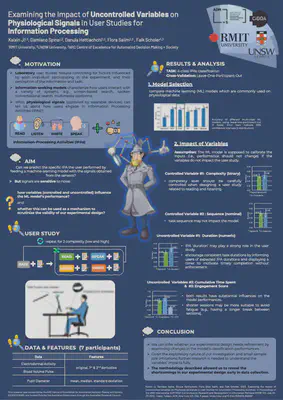Examining the Impact of Uncontrolled Variables on Physiological Signals in User Studies for Information Processing Activities
Abstract
Physiological signals have the potential to be applied as objective measures to understand the behaviour and engagement of users interacting with information access systems. However, the signals captured via wearable devices and eye-trackers are highly sensi- tive, and many controls are required in laboratory user studies. To investigate the extent to which controlled or confounding variables such as task sequence or duration influence the observed signals, we conducted a pilot study where each participant completed four types of information-processing activities (READ, LISTEN, SPEAK, and WRITE). At the same time, we collected data on blood volume pulse, electrodermal activity, and pupil responses. We then used machine learning approaches as a mechanism to quantify the in- fluence of controlled and confounding variables that commonly arise in user studies. Task duration was found to have a substantial effect, and can represent individual differences rather than giving insight into the primary experimental variables of interest. This work contributes to our understanding of such variables in the use of physiological signals in information retrieval user studies
